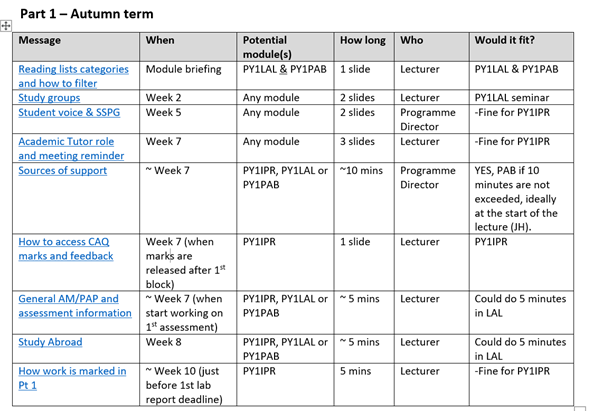By: Dr Jayne Freeman, School of Psychology and Clinical Language Sciences, j.e.freeman@reading.ac.uk

Overview
This case study reflects on an approach to enhance awareness of programme-level information in Psychology. Students often appear to have a lack of knowledge about key aspects of their programme. To address this, I introduced an approach of staggering the delivery of key programme-level messages in compulsory modules.
Objectives
- To enhance undergraduate Psychology students’ awareness of programme-level information by delivering strategically-timed messages in compulsory teaching sessions across the academic year
- To evaluate students’ perceptions of the usefulness of having programme-level information delivered in teaching sessions
Implementation
I developed a schedule for the timely distribution of programme-level information in compulsory teaching sessions for Part 1-3 Psychology students. This involved creating a table with a list of the key information that students might need to be aware of and some suggestions for when and in which module each message might best fit. For example, information about how to use assessment feedback was timed for when the first assessment marks were due for release. The table also specified the number of slides or approximate amount of time that would be needed to share the information and a suggestion for who might deliver it (e.g., me as Programme Director or the lecturer taking the class). I also included a link to the slides for staff to see the details of the information to be disseminated.
I then shared the table with teaching staff and asked them to indicate whether there would be sufficient time to fit the information in their lectures. In most cases, staff were able to accommodate the messages, or they suggested alternative sessions where the information could be delivered.

Impact
At the end of the academic year, students were asked to indicate how helpful it was to receive programme-level messages in lectures and whether they would prefer to receive such messages in lectures or in standalone briefings. They were also asked to say what they had learned from the messages that they hadn’t known before. Approximately, 83% of students reported that they found it quite or very helpful to have the messages in lectures and 65% said that they would prefer to have the messages delivered in lectures than in standalone briefings. Students reported that they had learned about a range of different areas, including student support, the library, marking criteria and other aspects of academic literacy. This suggests that the messages were providing students with important information that they had not obtained from elsewhere.
Reflections
Standalone briefings may not always be the best way of providing students with key messages about their programme as the information might not be reaching students at the optimal time. For example, information about late submission penalties presented in a start of year briefing may well be forgotten by the time students come to submit their first assessment. By strategically timing messages in compulsory lectures, students will have received the information when it was more relevant to them, thus hopefully enhancing its usefulness.
In light of the findings, we will continue to disseminate programme-level information through compulsory lectures (in addition to start of year briefings). However, for next year, I think it will be important for me to work with students to find out what information they consider would be useful and to identify what the optimal timing would be from their perspective, as this might not align with the timeline that I had proposed.


